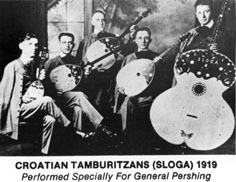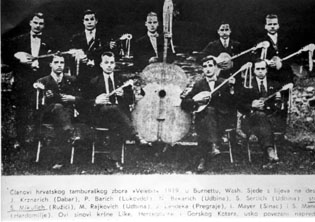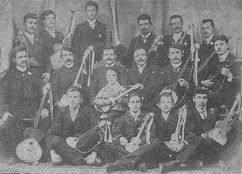Croatian Music
Darko Zubrinic, Zagreb (1995) An age
is known by its music
Croatian proverb (see [Kuhac])
Croatian Classical Music, 11th-19th centuries
The first Croatian neum manuscripts for church music date from the 11th century.
A special place in the history of Croatian music has the Glagolitic church singing. The earliest mention of glagolitic singing in Croatia is already from the year 1177.
The Passion procession on Croatian islands (like on Hvar for instance) has centuries old tradition with its roots in the Middle Ages.
The earliest known Croatian composers are Andrija Motovunjanin and Franjo Bosanac, 15-16th centuries.
Petar Hektorovic, a well known Croatian poet, nobleman, connoisseur of Latin language and classical literature from the 16th century, is also of interest for the history of Croatian music.
Bartol Gyurgieuvits (1506-1566), born in Turopolje near Zagreb, had spent 14 years enslaved in Turkish Empire. He was among the first in Europe to describe Islamic music.
Juraj Hus, a Croatian captive in Turkey, 16th century, became a military trumpeter for the Turkish army.
The Croats can boast of having two excellent Renaissance composers. The first one is Julije Skjavetic (Schiavetti) from the 16th century.
Ivan Lukacic (1584-1648), a Renaissance composer born in Sibenik, was conductor and organist in the Split Cathedral.
Gabriello Puliti (1580-1643), an Italian priest, was an important composer for lute and organ in various Croatian towns of Istria. Another interesting Italian composer was Tomaso Cechini (1580-1644).
Besides Lukacic, Vinko Jelic (1596-1636) was the most important representative of Croatian church music of the time.
A true jewel of Croatian culture is Pavlinski zbornik (Paulist collection) from 1644, a collection of church chants.
According to Juraj Krizanic (1618-1683), music should be regarded as a part of mathematics.
Kristofor Ivanovic, a Canon of the town of Budva in Boka kotorska, published his Memorie teatrali in Venice in 1681, the first history of Venetian opera.
Petar Nakic (1694-~1769), born near the town of Sibenik, and better known under his italianized name Pietro Nacchini, is one of the most important representatives of Croatian late Baroque and early Classicism.
Cithara Octochorda is the most significant old collection of Latin - Croatian Church songs, published in 1701 in Vienna.
Luka Sorkocevic (1734-1789), composer of beautiful symphonies, lived in Dubrovnik.
The Dubrovnik polyptich by Lovro Dobricevic from 1466, contains a detail with an angel playing portative.
Ivan Mane Jarnovic (Italianized name Giornovichi, 1740-1804) was an outstanding Croatian violinist and composer of the 18th century, probably from Dubrovnik.
Joseph Haydn (1738-1803) was born in a Croatian ethnic enclave in Burgenland (Gradisce) in Austria.
Parents of Franz Joseph Haydn are Mathias Haiden and Anna Maria Haidin, as can be seen on their grave in the Rohrau cemetery even today. This is stated by outstanding Croatian musicologist academician Lovro Zupanovic.
The poet J. W. Goethe translated some of our most beautiful folk ballades into German (from their Italian translation, done by Alberto Fortis; see his Viaggio in Dalmazia, Venice 1774).
The verses for the Austrian national anthem "Land der Berge, Land am Storme", were written by Paula von Preradovic (1887-1951).
Vatroslav Lisinski composed the first Croatian national opera "Ljubav i zloba" ("Love and malice") in 1846.
Operas composed by Ivan Zajc (1832-1914) and Jakov Gotovac (1895-1982) are performed in concert halls throughout the world. The most famous opera of Jakov Gotovac is Ero s onoga svijeta, which has been translated into 9 languages and performed in about 80 countries.
A well known tune "U boj, u boj!" from the opera "Nikola Subic Zrinski" by Ivan Zajc is taught in Japanese schools, and sung in Japan already since 1919!
Julije Bajamonti (1744-1800) wrote an article "Il medico e la musica" ("The physician and music"), an essay on musical therapy, one of the first in history.
The verses for the Croatian national anthem Our Beautiful Homeland (Lijepa nasa domovino) were written by a Croatian poet and diplomat Antun Mihanovic (1796-1861). Many sources repeat that the music was composed by Josip Runjanin (1821-1878), but according to Andrija Tomasek, there are no reliable proofs for this.
Ivan Padovec (1800-1873), was a guitar virtuoso, who gave concerts in Zagreb, Vienna, Prague, Budapest, Hamburg, London, in Poland, Russia etc.
Illma de Murska (1834 - 1889) was an opera diva of international fame, nicknamed Croatian canary and Croatian nightingale.
Joseph Angster (1834-1918) was a famous church organ constructor.
Franjo Krezma (born in 1862) had a reputation of an authentic violin virtuoso, and was a concert master in the Royal orchestra in Berlin (today's Berliner Philharmonie) at the age of 17.
Croatian violinist and violist Louis Svecenski (1862-1926) was director of the New York Institute of Music.
Croatian Classical Music, 20th-21st centuries
Franjo Dugan (1874-1948) was the Zagreb Cathedral organist since 1910.
Rudolph Matz (1901-1988) is perhaps the greatest cello theoretician in the world (opinion expressed by Leonard Rose).
The Zagreb Soloists have been founded by Antonio Janigro in 1954, led among other by maestro Tonko Ninic (until 1997).
- Dora Pejacevic (1885-1923) is the first important female composer in Croatia
- Krsto Odak (1888-1961), important Croatian composer of sacral music
- Zlatko Balokovic (1895-1965), a famous Croatian violinist. He was in possession of Guarneri's famous 1735 violin "the King".
- Lovro von Matacic, one of the greatest conductors of the 20th century (1899-1985)
- opera singers
- Josip Kasman (1850-1925), the first Croat that had opportunity to sing in the New York Metropolitan (in 1883)
- Milka Trnina (or Ternina, 1863-1941), according to Giacomo Puccini, the best "Tosca" that he had opportunity to listen to.
- Zinka Kunc-Milanov (1906-1989)
- Djurdja Milinkovic (1913-1986)
- Srebrenka Sena Jurinac (1921)
- Dragica Martinis (1922)
- Nada Puttar - Gold (1923)
- Biserka Cvejic (r. Katusic) (1923)
- Ruza Pospis-Baldani (1942)
- Dunja Vejzovic (1943)
- Vladimir Ruzdjak (1922-1987)
- Tino Pattiera (1890-1966), a famous baritone, born in the lovely town of Cavtat near Dubrovnik
- Andjelko Klobucar (1931), organ player and church music composer
- Berislav Klobucar (1924), one of the greatest Croatian conductors, born in Zagreb
- Miroslav Miletic, a famous viola player
- Milan Turkovic, one of the few internationally known bassoon soloists
- Vjekoslav Sutej (1951), a renowned Croatian conductor
- Lyra, excellent choir of the Jewish Community in Zagreb, conducted for many years by Emil Cosetto.
Melita Lorkovic (1907-1987) was an internationally known classical pianist.
Albe Vidakovic (1914 - 1964), born in the town of Subotica in Backa, an important composer of Croatian church music.
Radovan Lorkovic (1932), professor of violin in Basle in Switzerland and concert master
Artists of international reputation:
- the violoncellist Valter Despalj (1947)
- the violoncellist Monika Leskovar (1981)
- the violoncellist Stjepan Hauser (1986)
- the pianist Vladimir Krpan (1938)
- the pianist Ivo Pogorelic (1958),
- the pianist Lovro Pogorelic (1970)
- the pianist Kemal Gekic,
- Radovan Vlatkovic (1962), distinguished horn soloist
- Viktor Vidovic (1973) and Ana Vidovic (1980), brilliant guitarists
- Zoran Dukic (1969), outstanding Croatian classical guitarist
- Robert Belinic (1982) outstanding Croatian classical guitarist
- Maksim Mrvica, very popular pianist (1975)
- in jazz - a vibraphonist Bosko Petrovic (1935).
Mia Slavenska (1914-2002), ballerina of the Zagreb Opera (1930-33), in 1950's prima ballerina of the Metropolitan Opera in New York.
The Osor Musical Evenings (Osorske glazbene veceri ) have been founded in 1976 by Mr Danijel Marusic.
The well known musical ``The Canterbury Tales'', which played in London for quite a long time, was directed by Vlado Habunek.
An important cultural manifestation held in Zagreb is the Music Biennale, devoted to contemporary, experimental and avant-garde music. Let us mention only a few names:
- Milko Kelemen, professor of composition in Stuttgart
- Josip Magdic (1937), professor in Sarajevo and Zagreb
- Igor Kuljeric (1938-2006), outstanding Croatian composer and conductor.
Several masters of classical music which belong to younger generation are:
Katarina Livljanic founded a French international Dialogos Ensemble in Paris in 1996.
Edin Dino Zonic, conductor and cultural ambassador, born and raised in Sarajevo, founded Unity Through Music.
Bosnian Croat Dejan Ivanovic, classical guitarist.
Antonio Macan, born in 1988 in Frankfurt am Main, Croatian pianist.
Zvjezdice (Little Stars), all girls' choir, founded in 1985 in Zagreb, conducted by Mr. Zdravko Sljivac
Croatian Pop and Folk Music
Ivo Robic (1923-2000), a famous Croatian pop singer nicknamed "Mr Morgen".
In 1999 Croatian pop singer Tereza Kesovija received an important French recognition Chevalier des Arts et Lettres for contributions to culture.
Dunja Rajter (Dunja Reiter) is a well known Croatian singer and actress living in Germany.
Nenad Bach is a recording artist, composer, and performer living in New York.
Tamara Obrovac: My approach towards music went from jazz standards, ... connecting the language of the folk music of my homeland (Istria, Croatia).
Rock guitarist Damir Simic - Shime.
Zlatan Stipisic Gibonni, Croatian songwriter and singer, UNICEF's Goodwill ambassador since 2003.
In Croatian folk music very original type of music can be heard on Croatian islands (primarily on Krk, Rab, Cres), region of Vinodol, Kastav and in Istria, based on the famous Istrian scale, sounding "out of tune". Specific way of singing is accompanied by a wind instrument called sopele (or sopile), often linked with church holidays and patron saints.
- first or mail voice ("na debelo"): E, F, G, Ab, B, Cb
- second or female voice ("na tanko"): C##, D#, E, F, G, Ab
Here we have indeed C## (cisis). Note that we have six pairs of big secunda's.
Klapa musicTamburitza, the Croatian national string instrument and one of the hallmarks of Croatia.
Croats from Lika, Gorski Kotar and Hercegovina, during their stay in Burnett, Washington, in 1919:
Karen White:
...In Croatia, the first group of six tambura players was said to be formed by Pajo Kolaric of Osijek in 1847. The first tambura concert was given by Ivan Sladicek with a group of four players in Zagreb in 1879. In 1882, the first studies of the music were begun by Mijo Majer with a group of four students at the University in Zagreb.
In the U. S. today, tamburitza music is alive and thriving. In fact, it is claimed by some to be the single most prevalent ethnic instrument transplanted to America from a foreign land.
Kolar, Walter W., An Introduction to Croatian Musical Folklore, (Tamburitza) Pittsburgh, PA 1981
Croats in Punta Arenas, Chile (Magallanes region), with
their tamburitzas
Croatian tamburitza band Tomislav in Punta Arenas, 1905
Hrvatsko tamburasko drustvo Tomislav, Punta Arenas, 1905
(photo from Lj. Antic, Hrvati u J. Americi, Zagreb, 1991, pp 182 and 266,
)
It is not widely known that Leo Fender, a famous builder of rock guitars (Fender Stratocaster), used the shape of a Croatian tamburitza head (more precisely, of the so called "brac" or "bas-prim", see below) for his characteristic guitar head.
Jerry Grcevich, USA, is outstanding performer of Croatian tamburitza music, one of the best players of today.
Hand in hand with folk music go the national costumes and dances in which one can see such a rich source of creativeness and imagination
The King of Dolls! - Since 1991 an invaluable
collection of more than 350 dolls owned by Mr Ljeposlav Perinic,
Argentina, is in Zagreb, Croatian capital.
References related to Croatian music:
- F. Kuhac: Ilirski glazbenici, HSN, 1994 (reprinted from 1893 edition), with afterword of academician Lovro Zupanovic; on p. 5 Kuhac cites the following Croatian proverb: Po zveku (glazbi) se vrieme pozna, that we took as the motto of this web page.
- Miho Demovic: Glazba u staroj hrvatskoj drzavi, pp 103-155, in [Prvi hrvatski kralj Tomislav]
- Stanislav Tuskar: Kratka povijest hrvatske glazbe, Matica hrvatska, Zagreb 2000.
- Lovro Zupanovic: Glazbena kultura, in [Croatia - Europe, volume II],
- Jerko Bezic: Glagoljasko pjevanje, in [Croatia - Europe, volumes I and II]
- Stefan Kocsis: Die sakrale Musik der burgenlšndischen Kroaten
in Geschichte und Gegenwart - Maestro degl'Ivellio nam predstavlja, at www.croatia.ch
Bunjevci Croats in Backa
Pere Tumbas - Hajo (1891-1967), conductor, composer, and the famous tamburitza player, very active among Backa Croats in Subotica, his birthplace.Josip Andric (1894-1967) wrote an opera Duzijanca for tamburitza.
Albe Vidakovic (1914 - 1964), born in the town of Subotica in Backa, was an important composer of Croatian church music.
Ivan Saric, constructor of airplanes Subotica already in 1913.
An important poet was Jakov Jaso Kopilovic (1918 - 1997), born as a Bunjevac Croat in the city of Subotica. His close friend and colleague Joja Ricov described the difficulties that he encountered in his life.
References related to the history of Backa Croats (Bunjevci and Sokci):
- Academician Ante Sekulic (born in Tavankut in Backa):
- Rjecnik govora Backih Hrvata, Institut za hrvatski jezik i jezikoslovlje, Katolicki institut za kulturu, povijest i duhovnost "Ivan Antunovic", Zagreb 2005, ISBN: 953-6637-26-X
- Backi Hrvati - Narodni zivot i obiccaji, Zbornik za narodni zivot i obicaje Juznih Slavena 52, JAZU (now HAZU), Zagreb, 1991 (519 pages)
- Rasprave o jeziku backih Hrvata, Matica hrvatska, Zagreb, 1997 (291 pages)
- Umjetnost i graditeljstvo backih Hrvata, Matica hrvatska, Zagreb, 1998 (171 pages) Serbianism in Podunavlje (the Danube region) 1918-1995
- Hrvatska preporodna knjizevnost u ugarskom podunavlju do 1918., Sekcija DHK i Hrvatskog centra PEN-a za proucavanje knjizevnosti u hrvatskom iseljenistvu, Zagreb 1994, ISBN 953-6260-01-8
- Knjizevnost podunavskih Hrvata u XX. stoljecu, Sekcija DHK i Hrvatskog centra PEN-a za proucavanje knjizevnosti u hrvatskom iseljenistvu, Zagreb 1996, ISBN 953-6260-03-4
- Pavlinski prinosi hrvatskoj knjizevnosti, Sekcija DHK i Hrvatskog centra PEN-a za proucavanje knjizevnosti u hrvatskom iseljenistvu, Zagreb 1997, ISBN 953-6260-04-2
- Karmelicanski prinosi hrvatskoj knjizevnosti, Sekcija DHK i Hrvatskog centra PEN-a za proucavanje knjizevnosti u hrvatskom iseljenistvu, Zagreb 2001, ISBN 953-6260-07-7
- Petar Pekic: Povijest Hrvata u Vojvodini, Matica hrvatska, Zagreb, 1930.
- The Croatian Bunjevci, by Evetovic-Pekic-Sokcic, Croatian Almanac, 1986
- Duzijanca
- Klasje nasih ravni, Subotica
- Hrvatska rijec
- Bozicni obicaji kod backih Hrvata - Bunjevaca
- Naco Zelic: Protiv zaborava, Hrvatsko kulturno prosvjetno drustvo "Matija Gubec" Tavankut (1946.-1996.), Zagreb, 2000., ISBN 953-6526-20-8
- Zlata Gvozdic-Filjak, Juraj Loncarevic: Srijemska kalvarija Hrvata, Znanje, Zagreb, 1995
- Stojan Kujundzic: Nasi mladenci, Hrvatsko akademski drustvo, Subotica, 2004.
- Marija Maftej-Dulic: Bozicni obicaji kod backih Hrvata - Bunjevaca
- Zvonik, katolicki list
- Stranica za duhovna zvanja Suboticke biskupije
- Demokratski savez Hrvata u Vojvodini (DSHV)
- Mi, doljepotpisani pripadnici Bunjevackog roda... (o dijalektalnom ikavskom govoru bunjevacko-sokackih Hrvata)
- Matija Gubec - Tavankut
- Leksikon podunavskih Hrvata - Bunjevaca i Sokaca,
Hrvatsko akademsko drustvo (HAD), Subotica, 2004,
- 1. dio (AB), 60 str.
- 2. dio (B), 77 str.
Croatia - overview of its History, Culture and Science


